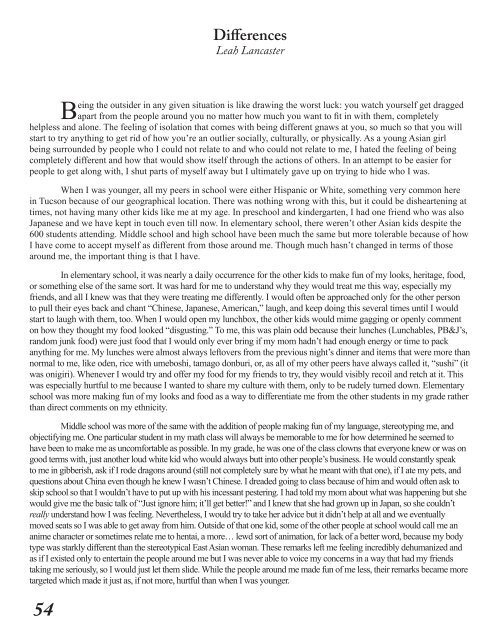SandScript 2022
Art & Literature Magazine
Art & Literature Magazine
You also want an ePaper? Increase the reach of your titles
YUMPU automatically turns print PDFs into web optimized ePapers that Google loves.
Differences<br />
Leah Lancaster<br />
Being the outsider in any given situation is like drawing the worst luck: you watch yourself get dragged<br />
apart from the people around you no matter how much you want to fit in with them, completely<br />
helpless and alone. The feeling of isolation that comes with being different gnaws at you, so much so that you will<br />
start to try anything to get rid of how you’re an outlier socially, culturally, or physically. As a young Asian girl<br />
being surrounded by people who I could not relate to and who could not relate to me, I hated the feeling of being<br />
completely different and how that would show itself through the actions of others. In an attempt to be easier for<br />
people to get along with, I shut parts of myself away but I ultimately gave up on trying to hide who I was.<br />
When I was younger, all my peers in school were either Hispanic or White, something very common here<br />
in Tucson because of our geographical location. There was nothing wrong with this, but it could be disheartening at<br />
times, not having many other kids like me at my age. In preschool and kindergarten, I had one friend who was also<br />
Japanese and we have kept in touch even till now. In elementary school, there weren’t other Asian kids despite the<br />
600 students attending. Middle school and high school have been much the same but more tolerable because of how<br />
I have come to accept myself as different from those around me. Though much hasn’t changed in terms of those<br />
around me, the important thing is that I have.<br />
In elementary school, it was nearly a daily occurrence for the other kids to make fun of my looks, heritage, food,<br />
or something else of the same sort. It was hard for me to understand why they would treat me this way, especially my<br />
friends, and all I knew was that they were treating me differently. I would often be approached only for the other person<br />
to pull their eyes back and chant “Chinese, Japanese, American,” laugh, and keep doing this several times until I would<br />
start to laugh with them, too. When I would open my lunchbox, the other kids would mime gagging or openly comment<br />
on how they thought my food looked “disgusting.” To me, this was plain odd because their lunches (Lunchables, PB&J’s,<br />
random junk food) were just food that I would only ever bring if my mom hadn’t had enough energy or time to pack<br />
anything for me. My lunches were almost always leftovers from the previous night’s dinner and items that were more than<br />
normal to me, like oden, rice with umeboshi, tamago donburi, or, as all of my other peers have always called it, “sushi” (it<br />
was onigiri). Whenever I would try and offer my food for my friends to try, they would visibly recoil and retch at it. This<br />
was especially hurtful to me because I wanted to share my culture with them, only to be rudely turned down. Elementary<br />
school was more making fun of my looks and food as a way to differentiate me from the other students in my grade rather<br />
than direct comments on my ethnicity.<br />
Middle school was more of the same with the addition of people making fun of my language, stereotyping me, and<br />
objectifying me. One particular student in my math class will always be memorable to me for how determined he seemed to<br />
have been to make me as uncomfortable as possible. In my grade, he was one of the class clowns that everyone knew or was on<br />
good terms with, just another loud white kid who would always butt into other people’s business. He would constantly speak<br />
to me in gibberish, ask if I rode dragons around (still not completely sure by what he meant with that one), if I ate my pets, and<br />
questions about China even though he knew I wasn’t Chinese. I dreaded going to class because of him and would often ask to<br />
skip school so that I wouldn’t have to put up with his incessant pestering. I had told my mom about what was happening but she<br />
would give me the basic talk of “Just ignore him; it’ll get better!” and I knew that she had grown up in Japan, so she couldn’t<br />
really understand how I was feeling. Nevertheless, I would try to take her advice but it didn’t help at all and we eventually<br />
moved seats so I was able to get away from him. Outside of that one kid, some of the other people at school would call me an<br />
anime character or sometimes relate me to hentai, a more… lewd sort of animation, for lack of a better word, because my body<br />
type was starkly different than the stereotypical East Asian woman. These remarks left me feeling incredibly dehumanized and<br />
as if I existed only to entertain the people around me but I was never able to voice my concerns in a way that had my friends<br />
taking me seriously, so I would just let them slide. While the people around me made fun of me less, their remarks became more<br />
targeted which made it just as, if not more, hurtful than when I was younger.<br />
54<br />
While not an often occurrence, some of the other kids would also tease me for the way I spoke. At home,<br />
my mother would speak to my brother and me almost exclusively in Japanese so my monolingual English-speaking<br />
father, who was almost always gone on some sort of business trip, didn’t impact how I learned to pronounce words<br />
as much. At this point in my life, I understood that most people weren’t genuinely interested in learning about my<br />
culture, so I wouldn’t speak at all in Japanese but people would still find a way to make fun of the way I would<br />
pronounce certain words as a result of my upbringing and whenever I would correctly pronounce something that<br />
happened to be Japanese. For the most part, it wasn’t like times when my accent would show itself were a common<br />
occurrence, particularly because Japan was mostly associated with anime (something deemed “cringe” by the vast<br />
majority of my school), so I wasn’t mocked for the way I spoke that often. Still, I remember being made fun of for<br />
the way that I would say words like “monkey” or “vitamin” or just how I would slur my words in a particular way,<br />
though I’m still not sure what exactly that “particular way” was. This kind of teasing wasn’t too bad and it never<br />
went far, mostly just repeating the word, scrunching their face up a little in confusion, and simply laughing at me.<br />
Trying to hide myself was something that I could never quite go all-in with. I had been told almost outright to<br />
think that the parts of myself that made me different were shameful and disgusting, something that I would be better<br />
keeping out of sight from everyone else. I had been so used to being ridiculed for a part of myself that I couldn’t change<br />
that I would try and pretend that it wasn’t there. I would start to go along with people’s jokes, acting as if they weren’t<br />
slicing deeper every day, I would purposely mispronounce words and in doing so, whitewash myself, and I would start to<br />
pack more “acceptable” lunches even though eating heavier “American” food would often make me feel sick. This lasted<br />
for a couple of years until COVID hit, and we were forced into quarantine. Being forced to sit by myself with only the<br />
internet to connect myself with other people on social media with roughly the same experiences as me made me realize<br />
how foolish it was of me to live in a way that was only to make myself easier to digest for the people around me. This<br />
change wasn’t a sudden moment of clarity that I can write about but rather very gradual and mainly sparked from hearing<br />
others’ stories that were like mine. Though I have made leaps and bounds in terms of accepting myself, it is still a work in<br />
progress trying to unlearn years of conditioning.<br />
55<br />
Peacock Passion<br />
Rosemarie Dominguez<br />
Photograph




![SandScript 2023 [Digital Exclusive]](https://img.yumpu.com/68282062/1/190x238/sandscript-2023-digital-exclusive.jpg?quality=85)

